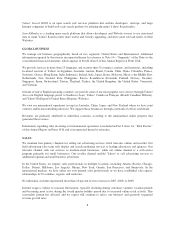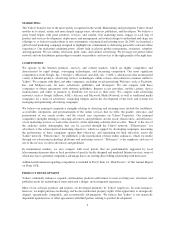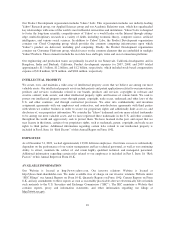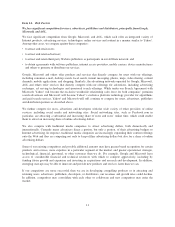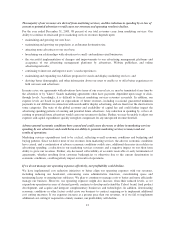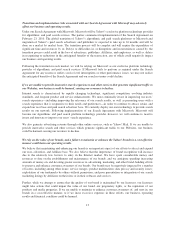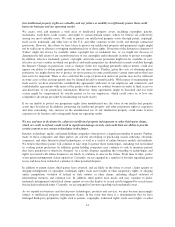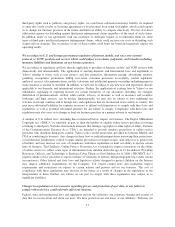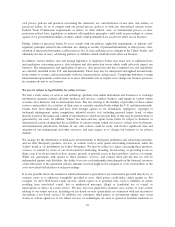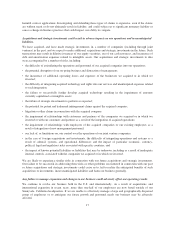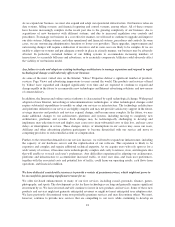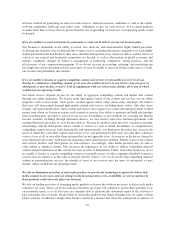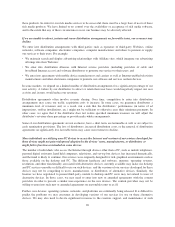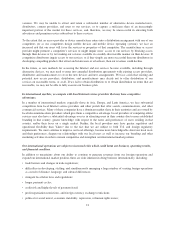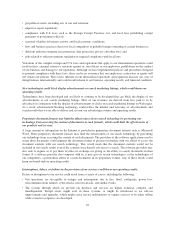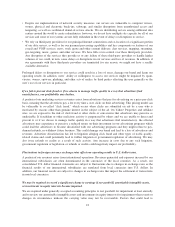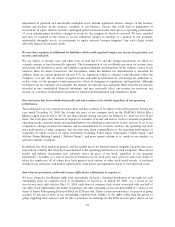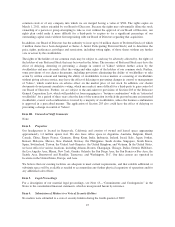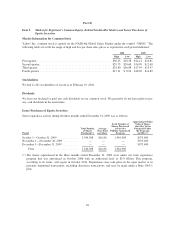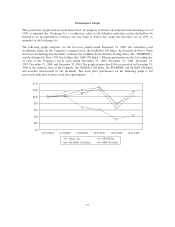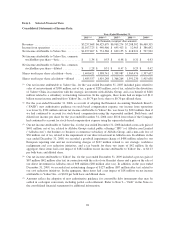Yahoo 2009 Annual Report Download - page 26
Download and view the complete annual report
Please find page 26 of the 2009 Yahoo annual report below. You can navigate through the pages in the report by either clicking on the pages listed below, or by using the keyword search tool below to find specific information within the annual report.As we expand our business, we must also expand and adapt our operational infrastructure. Our business relies on
data systems, billing systems, and financial reporting and control systems, among others. All of these systems
have become increasingly complex in the recent past due to the growing complexity of our business, due to
acquisitions of new businesses with different systems, and due to increased regulation over controls and
procedures. To manage our business in a cost effective manner, we will need to continue to upgrade and improve
our data systems, billing systems, and other operational and financial systems, procedures and controls. In some
cases, we are outsourcing administrative functions to lower-cost providers. These upgrades, improvements and
outsourcing changes will require a dedication of resources and in some cases are likely to be complex. If we are
unable to adapt our systems and put adequate controls in place in a timely manner, our business may be adversely
affected. In particular, sustained failures of our billing systems to accommodate increasing numbers of
transactions, to accurately bill users and advertisers, or to accurately compensate Affiliates could adversely affect
the viability of our business model.
Any failure to scale and adapt our existing technology architecture to manage expansion and respond to rapid
technological change could adversely affect our business.
As some of the most visited sites on the Internet, Yahoo! Properties deliver a significant number of products,
services, Page Views and advertising impressions to users around the world. The products and services offered
by Yahoo! have expanded and changed significantly over time and are expected to continue to expand and
change rapidly in the future to accommodate new technologies and Internet advertising solutions, and new means
of content delivery.
In addition, the Internet and online services industry is characterized by rapid technological change. Widespread
adoption of new Internet, networking or telecommunications technologies, or other technological changes could
require substantial expenditures to modify or adapt our services or infrastructure. The technology architectures
and platforms utilized for our services are highly complex and may not provide satisfactory support in the future,
as usage increases and products and services expand, change, and become more complex. In the future, we may
make additional changes to our architectures, platforms and systems, including moving to completely new
architectures, platforms and systems. Such changes may be technologically challenging to develop and
implement, may take time to test and deploy, may cause us to incur substantial costs or data loss, and may cause
delays or interruptions in service. These changes, delays, or interruptions in our service may cause our users,
Affiliates and other advertising platform participants to become dissatisfied with our service and move to
competing providers or seek remedial actions or compensation.
Further, to the extent that demands for our services increase, we will need to expand our infrastructure, including
the capacity of our hardware servers and the sophistication of our software. This expansion is likely to be
expensive and complex and require additional technical expertise. As we acquire users who rely upon us for a
wide variety of services, it becomes more technologically complex and costly to retrieve, store, and integrate data
that will enable us to track each user’s preferences. Any difficulties experienced in adapting our architectures,
platforms and infrastructure to accommodate increased traffic, to store user data, and track user preferences,
together with the associated costs and potential loss of traffic, could harm our operating results, cash flows from
operations, and financial condition.
We have dedicated considerable resources to provide a variety of premium services, which might not prove to
be successful in generating significant revenue for us.
We offer fee-based enhancements to many of our free services, including e-mail, personals, finance, games,
photographs, and sports. The development cycles for these technologies are long and generally require significant
investment by us. We have invested and will continue to invest in new products and services. Some of these new
products and services might not generate anticipated revenues or might not meet anticipated user adoption rates.
We have previously discontinued some non-profitable premium services and may discontinue others. We must,
however, continue to provide new services that are compelling to our users while continuing to develop an
18


